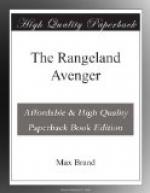3
Riley Sinclair rode over the mountain. An hour of stern climbing lay behind him, but it was not sympathy for his tired horse that made him draw rein. Sympathy was not readily on tap in Riley’s nature. “Hossflesh” to Riley was purely and simply a means to an end. Neither had he paused to enjoy that mystery of change which comes over mountains between late afternoon and early evening. His keen eyes answered all his purposes, and that they had never learned to see blue in shadows meant nothing to Riley Sinclair.
If he looked kindly upon the foothills, which stepped down from the peaks to the valley lands, it was because they meant an easy descent. Riley took thorough stock of his surroundings, for it was a new country. Yonder, where the slant sun glanced and blinked on windows, must be Sour Creek; and there was the road to town jagging across the hills. Riley sighed.
In his heart he despised that valley. There were black patches of plowed land. A scattering of houses began in the foothills and thickened toward Sour Creek. How could men remain there, where there was so little elbow room? He scowled down into the shadow of the valley. Small country, small men.
Pictures failed to hold Riley, but, as he sat the saddle, hand on thigh, and looked scornfully toward Sour Creek, he was himself a picture to make one’s head lift. As a rule the horse comes in for as much attention as the rider, but when Riley Sinclair came near, people saw the man and nothing else. Not because he was good-looking, but because one became suddenly aware of some hundred and eighty pounds of lithe, tough muscle and a domineering face.
Somewhere behind his eyes there was a faint glint of humor. That was the only soft touch about him. He was in that hard age between thirty and thirty-five when people are still young, but have lost the illusions of youth. And, indeed, that was exactly the word which people in haste used to describe Riley Sinclair—“hard.”
Having once resigned himself to the descent into that cramped country beneath he at once banished all regret. First he picked out his objective, a house some distance away, near the road, and then he brought his mustang up on the bit with a touch of the spurs. Then, having established the taut rein which he preferred, he sent the cow pony down the slope. It was plain that the mustang hated its rider; it was equally plain that Sinclair was in perfect touch with his horse, what with the stern wrist pulling against the bit, and the spurs keeping the pony up on it. In spite of his bulk he was not heavy in the saddle, for he kept in tune with the gait of the horse, with that sway of the body which lightens burdens. A capable rider, he was so judicious that he seemed reckless.




